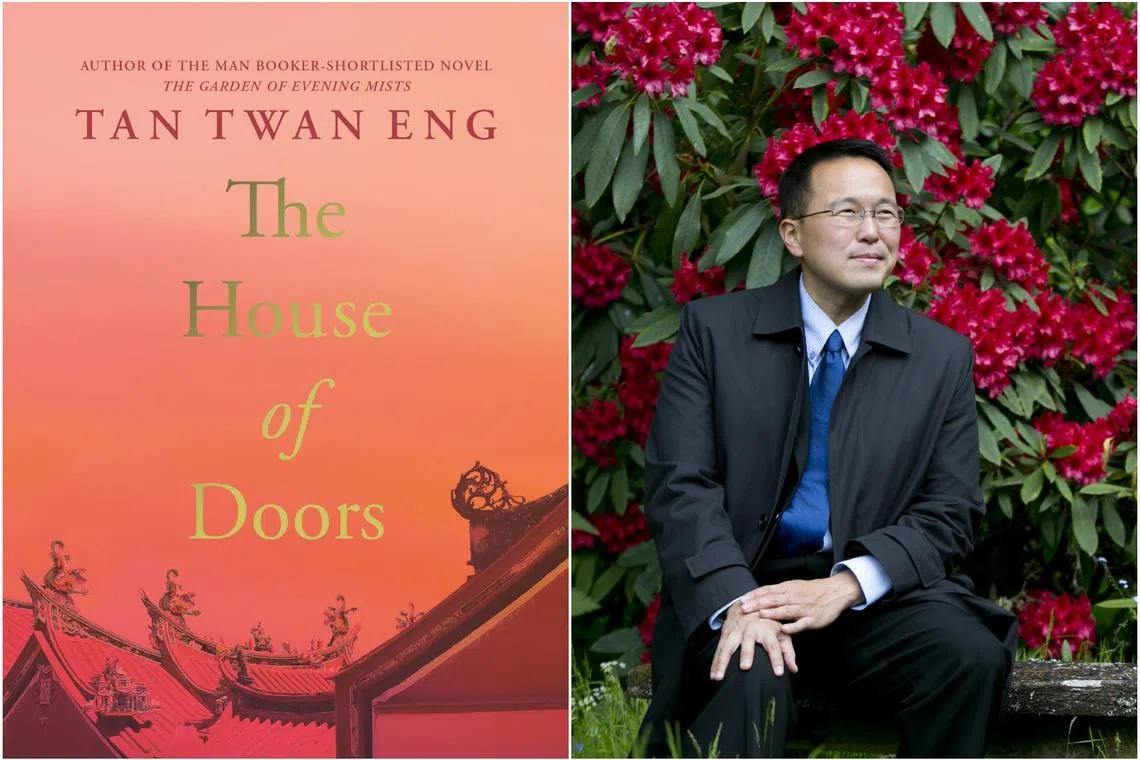Malaysian author Tan Twan Eng’s House Of Doors scores Booker longlist hat-trick
Sign up now: Get ST's newsletters delivered to your inbox

Malaysian author Tan Twan Eng’s The House Of Doors has earned a place on the longlist of the prestigious Booker Prize.
PHOTOS: LLOYD SMITH/WRITER PICTURES, PANSING
SINGAPORE – The House Of Doors may be Malaysian author Tan Twan Eng’s first novel in 10 years, but one thing has remained the same: It earned a place on the longlist of the prestigious Booker Prize.
The 51-year-old former lawyer has written two other books, The Gift Of Rain, nominated for the longlist in 2007, and The Garden Of Evening Mists, which made it further into the shortlist in 2012.
That The House Of Doors is once more on this year’s longlist gives Tan a “100 per cent strike rate” – something he was told by the Booker Prize people was unprecedented.
“I feel extremely privileged and proud,” Tan says, speaking over Zoom from the United Kingdom. “Each nomination is different, because I’m a different person and writer than I was. And each longlist is different as well.”
This year’s longlist is dominated by lesser-known writers, including four debuts.
“It’s a varied and strong longlist,” Tan says. “The only writer I know is Sebastian Barry. He’s not only a tremendously talented writer, but also great company – charming, chatty, full of energy. Unlike many of us writers, he’s also a great performer of his own writing.”
Irish novelist Barry is nominated for his novel Old God’s Time. Compared with Barry, Tan has been noticeably less prolific, a pattern Tan explains was partly due to an injured right knee that started to hurt during his book tour for The Garden Of Evening Mists.
The rehabilitation of this knee cartilage had entailed a drawn-out process of straightening a crooked knee and physiotherapy.
The success of The Garden Of Evening Mists also took up a lot of his time. Before the film directed by Taiwanese director Tom Lin Shu-yu was released in 2019, Tan scrutinised the script and was forced to pay close attention to the contract for this adaptation that ran to 200 pages and was constantly being altered.
Work on The House Of Doors started properly in 2021. “Some of the drafts were quite bad,” Tan says with a laugh. “Hopefully they never see the light of day.”
An immersive, languid lament, The House Of Doors brings the worlds of English writer Somerset Maugham and Chinese revolutionary leader Sun Yat Sen together in Penang, which once functioned as a sort of remote haven for those seeking refuge from the politics of their home countries.
Tan performs an act of historical ellipsis by bringing together Dr Sun’s extended stay in Penang and the real-life murder trial of Ethel Proudlock in 1910 for his story. While Dr Sun was in fact in Penang in 1910 to ask for financial support from the wealthy Straits Chinese, the Proudlock case took British colonial society in Kuala Lumpur by storm only in 1911.
Proudlock, a Eurasian, was accused and convicted of shooting dead a white mine manager who she claimed had attempted to rape her. Maugham wrote a well-known short story about the case titled The Letter, which appeared in the collection The Casuarina Tree (1926) and was later adapted into a play and several films.
Tan conducted research on this trial at the National Archives Singapore. “Court reporting over a century ago was not quite as professional as it is today – there were many gaps and inconsistencies and contradictions in the reporting. It took a lot of my lawyerly skills to make sense of the confusing transcripts.”
In The House Of Doors, Tan re-imagines how Maugham came to hear of the trial during a stay with the Hamlyn family 10 years later in Penang in 1921, and the impetus which led him to replace Proudlock’s name with that of Mrs Lesley Hamlyn in his short story. Mrs Hamlyn tells Maugham what really happened in 1910.
“The House Of Doors is sort of a reverse engineering of The Letter. Hopefully you re-read either one of the stories again and find that your perceptions of both have changed. I was trying to create this sense of a kaleidoscope and with a twitch of your hand, the pattern changes.”
Tan says Maugham is one of the most interesting and fascinating characters of the 20th century. “One of the things that differentiated him from his contemporaries was that he travelled so widely. When he started travelling, it was on steamships and by the end of his life, it was the jet,” he says.
He also cites Roman poet Horace’s Latin formulation Caelum non animum mutant qui trans mare currunt, or they who speed across the oceans, change the skies, but not their souls.
“I felt that Maugham was always trying to outrun some unhappiness in his life. He lived a double life. He was married, but also homosexual, and he always travelled with a male companion, Gerald Haxton.”
Asked why he has chosen to write through the eyes of two white characters, Mrs Hamlyn and Maugham, at a time when more Asian and African authors are reclaiming their voice, Tan says he does not think about the race of characters when writing. Readers learn about Dr Sun only through Hamlyn and Maugham’s eyes, despite Dr Sun’s headquarters in the 1900s being located just next door to where Tan’s father lived in Penang’s Armenian Street.
“I think, ‘What do I need for this story to work? How do I present the story best? How do I create this tension and experience for the reader?’ We are at a point in history where we should be able to write about any point in the past. At the end of the book, I hope that you see things slightly differently about the past and about the present and if I’ve achieved that, then I think it’s mission accomplished.”
All three of his novels are set in historical Malaysia, though Tan rejects the label of historical fiction. “What do you say about Ian McEwan’s Atonement, which was set in 1940s England? Or Kazuo Ishiguro’s The Remains Of The Day in the 1950s?”
A member of the judging panel on the 2023 International Booker Prize, he also adds that streaming services like Netflix have done a lot to prime younger audiences for stories in other languages.
In the spirit of The House Of Doors, which is really about lost loves and and the compromises people make rather than grand politics, Tan says he has been learning to play the piano. “When I turned 50 last year, I made a vow that I would start taking piano lessons. And I did. I would have preferred a proper piano or even a baby grand, but for neighbourly considerations, I got a digital piano.
“I had assumed that, with my enthusiasm, I’d find myself to be an undiscovered musical genius, but alas, no.”
The House Of Doors ($32.48), published by Canongate Books, is available at Amazon (
amzn.to/3YOmfw4
) and major bookstores.
This article contains affiliate links. If you buy through these links, we may earn a small commission.



